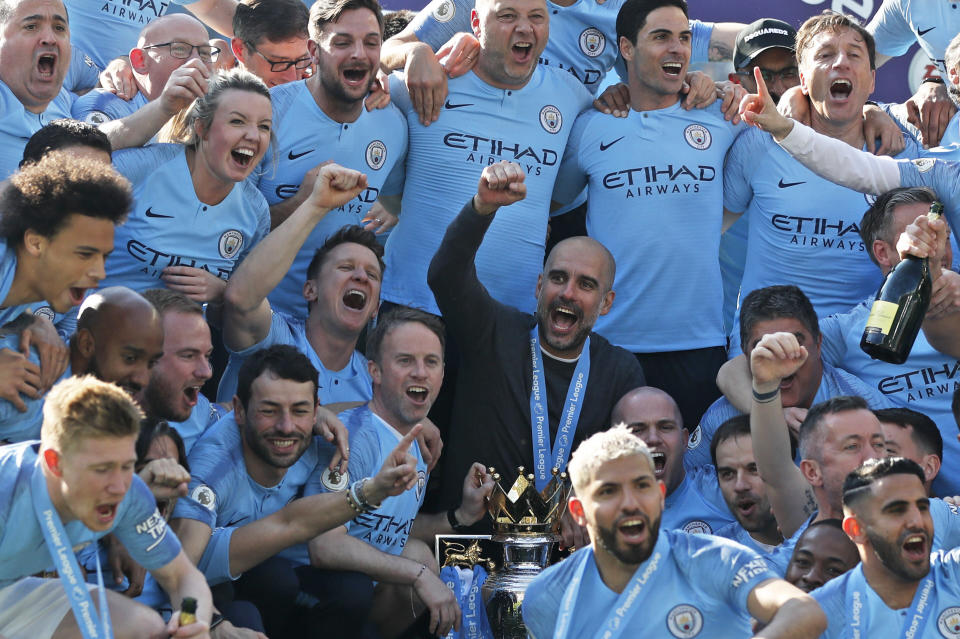Why this turned out to be one of the best Premier League seasons ever, parity be damned
“What a brilliant season it was,” Liverpool manager Jurgen Klopp said after it all ended for his Reds on Sunday, somewhat mournfully. There was still a Champions League final to play, but now the German was downcast.
Because winning titles is as much a matter of excellence as it is of timing. It boils down to your best seasons coinciding with your rivals’ slightly less-good seasons. In any Premier League season but this one and last year’s, Liverpool’s 97 points would have made the Reds champions. It’s just that for their historic greatness, Manchester City has been even greater, posting 98 points this year and 100 last year.
In no other season since the Premier League began in 1992-93 did anybody bag more than 95 points – that would be Chelsea, in 2004-05. And only the undefeated 2003-04 Arsenal team suffered fewer defeats than this one-loss Liverpool – but then the Gunners tied 12 games that year, to the Reds’ seven this season. Liverpool also scored 16 more goals and conceded four fewer than that legendary incarnation of Arsenal.
If this Liverpool had played in the 1996-97 Premier League season, it would have won the league by 22 points. Even three years ago, it would have been 16 points clear of surprise champions Leicester City.
But, you know, timing.
Timing was also what made the final day of this Premier League so exciting. Because neither City nor Liverpool had given ground in the title race, with the former clutching on to a single point over the latter on Sunday. All City had to do to be the back-to-back champions and clinch a fourth title in eight years was post a result that was equal to Liverpool’s – a win for a win; a tie for a tie, etc.
For 18 minutes or so, there was drama. Because in the 20th minute of the simultaneous slate of games, Liverpool was the champion-in-waiting. Sadio Mane had put Liverpool ahead against Wolverhampton Wanderers. City, meanwhile, went behind on a Glenn Murray header at Brighton & Hove Albion. City instantly replied with a goal by Sergio Aguero – he of the dramatic, league-winning tally in 2014 – and got the winner by the 38th minute, when Aymeric Laporte launched highest on a corner and nodded home.

From that moment on, it didn’t much matter that City wound up adding two more to win 4-1 and that Liverpool’s victory was comfortable at 2-0. Yet while the season ambled to its conclusion in the second halves, it had been the tightest title contest in years, probably since City won the aforementioned title over United on the final day of 2013-14.
There were two transcendent sides, dominating the other 18 teams – including the other big clubs in Manchester United, Chelsea, Tottenham Hotspur and Arsenal. City went 7-1-0 against those other four; Liverpool 5-0-3.
It made for remarkable spectacle.
And therein lay the other big takeaway of this season: Parity is overrated.
At the time of this writing, the gap between the league leaders and the last-placed team was larger in the Premier League than any of the other major leagues – without comparing the Bundesliga, which counts only 18 teams, rather than 20 like all the others. The English spread from best to worst was 82 points. In Italy, it was 74; in France, 62; and in Spain merely 51 points.
City had 29 more wins and scored 72 more goals than Huddersfield Town, which was admittedly an unusually poor team even for a last-place finisher.
But it was that disparity that made it all so enjoyable, that produced a scintillating finale to the season as Liverpool won its last nine games and City its last 14 – even though both needed fairly miraculous goals at various points along the way.
The stratospheric two-team race was the product of what some consider the competitive dysfunction of the Premier League. And you can indeed lament the inherent unfairness of City essentially having bottomless resources, courtesy of its owners and backers from Abu Dhabi – although the other English clubs are hardly any poorer. Or you can appreciate that the phenomenal squad all that money has bought, surrounded by the world’s best coach in Pep Guardiola and every last of the trappings his players could imagine, produced performances that were a joy to the eye. And that this impossibly high bar pushed other contenders, like Liverpool, to set after them in pursuit of that same, almost unattainable, perfection.
The argument against parity has always been that it supposedly puts off fans of the teams who can’t reasonably expect to win in the face of those prohibitive odds — a once-a-generation interloper like Leicester excepted. But then the Premier League has always been top-heavy, and that hasn’t stopped it from becoming the world’s most popular sports league. And during the years when it was probably gaining the most fans, around the turn of the millennium when satellite TV was becoming ubiquitous globally, a single team, Manchester United, won it 13 times in just 21 seasons.
City and Liverpool’s complete mastery of their league separated them by a full 25 points from their nearest pursuers, Chelsea, sure. But it also gave us one of the greatest domestic seasons of soccer in memory.
Leander Schaerlaeckens is a Yahoo Sports soccer columnist and a sports communication lecturer at Marist College. Follow him on Twitter @LeanderAlphabet.
More from Yahoo Sports:


